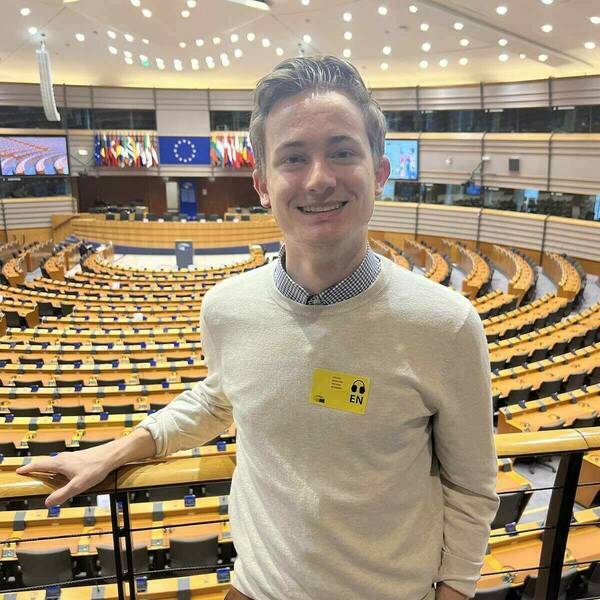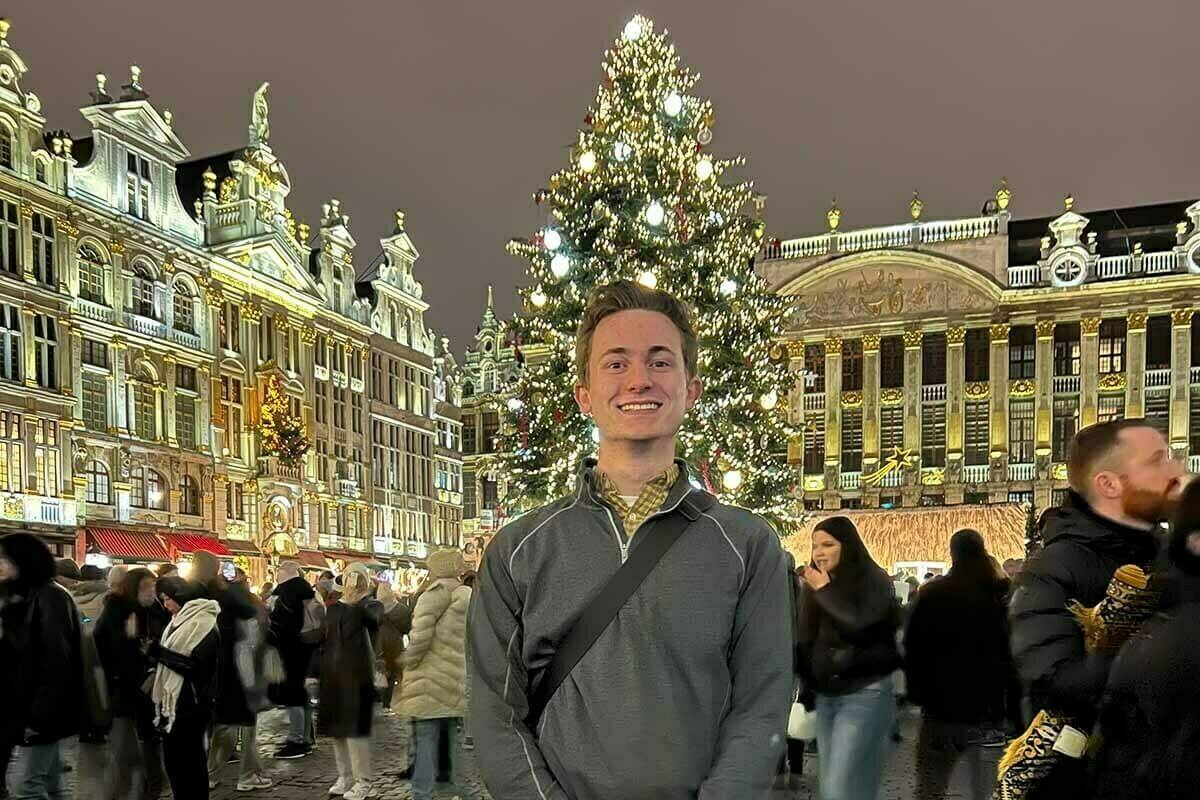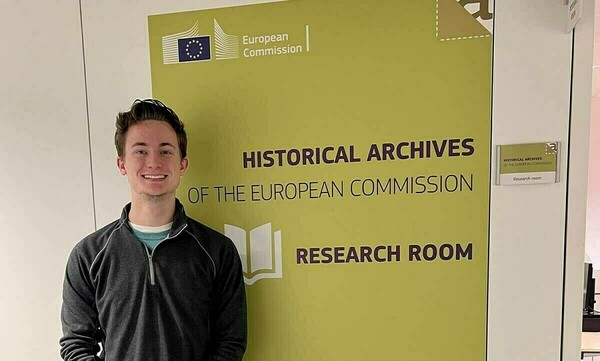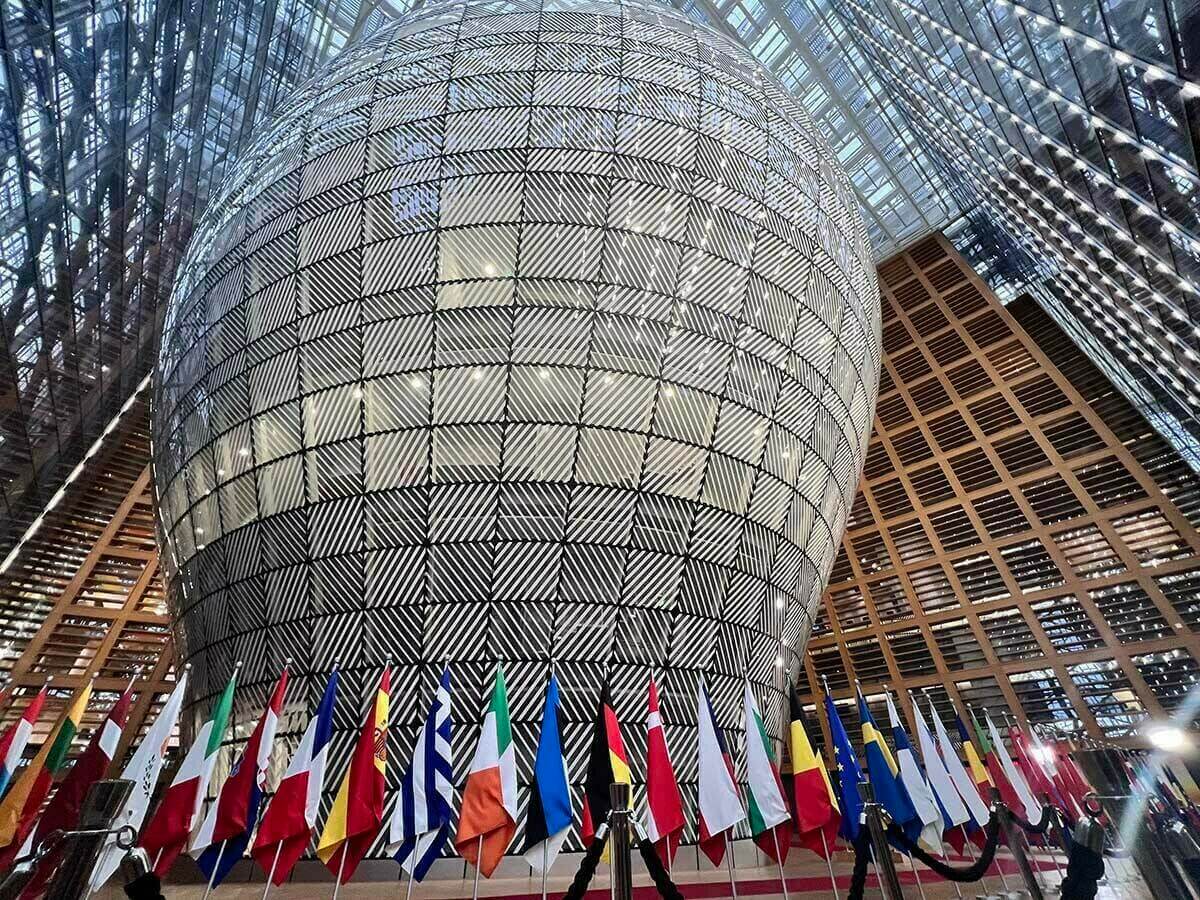
Jake Miller ’24 is an alumnus with political science and sociology double majors and a minor in European studies. In December 2024, he traveled to Brussels, Belgium, to complete research on the European Union for his thesis with assistance from the Nanovic Institute for European Studies and the Institute for Scholarship in the Liberal Arts, Jake previously served as a researcher in the “Writing the War in Ukraine” undergraduate research project.
“The Europe of today is stronger and more united than it has ever been,” exclaimed the tour guide as my classmates and I followed him out of the Museum of the Second World War in Gdańsk, Poland. It was June 2022, and I was entering my last few days of a three-week study abroad program in Poland. Led by Professors Emilia and Charles Powell, the program involved visits to several of Poland’s most historically significant cities and centered on the role of the international community in preventing mass atrocities. By the time I boarded my plane on the last morning, I was sure of one thing: modern Europe was nothing like the Europe of the 1940s. It was more peaceful, just, and democratic.
Perhaps the most significant example of European strength today is the European Union (EU), a political and economic union comprised of twenty-seven countries. Over the last six decades, the EU has worked to advance peace, reconciliation, and human rights, while expanding its membership. However, despite its achievements, a recent deterioration of rule of law has recently challenged its cohesion. Attacks on judicial independence and political interference in judicial appointments, among other factors, have tarnished the relationship between the EU and several of its member states. In some states, such as Spain and Bulgaria, breaches of the rule of law have come with warnings from the European Commission. In other cases, such as in Poland and Hungary, violations have spurred direct intervention and disciplinary investigations. Regardless of the outcome, the rule of law crisis risks inflicting lasting damage on an organization that prides itself on democratic unity.
Research at the source in Brussels
Fast forward to September 2023, and after a few meetings with Emilia Powell, professor of political science and concurrent professor of law, who graciously offered to be my thesis advisor, I had my project figured out. I wanted to explore why rule of law crises impact some states and not others and examine whether the EU has the tools to respond effectively to these crises. Since Brussels is home to the primary institutions of the EU, I decided that it would be an ideal place to conduct preliminary research. With the generous support of the Nanovic Institute for European Studies and the Institute for Scholarship in the Liberal Arts, I was able to make my vision a reality over the winter break of 2024.

Less than a day after departing campus, I found myself standing in Grand-Place, the central square of Brussels, staring up in awe at the magnificent City Hall and the thousands of Christmas lights that adorned it. After spending a few minutes taking in the new sights, I hopped on the metro to the European Quarter, where I spent most of my week exploring and conducting research. During my time in Brussels, I had the opportunity to visit several of the institutions that keep the EU running. While at the European Parliament, I received a guided tour of the hemicycle, where elected representatives from the twenty-seven member states meet and debate pertinent policy matters. I even met a few other people at the hemicycle who were also conducting research for their undergraduate theses.
I spent the next day exploring the Europa Building, an impressive landmark combining Art Deco and contemporary styles that hosts the European Council and Council of the European Union. After my tours, I had the afternoons free to visit the Parlamentarium and the House of European History, two museums offering in-depth looks at Europe of the past, present, and future.
Delving into the EU archives

The rest of the week involved extensive archival research at the Historical Archives of the European Commission. Equipped with a computer and a microfiche reader, I pored over hundreds of documents about the first years of the European Union and the early development of its rule of law framework.
The documents included letters from Robert Schuman and Jean Monnet —the architects of the European integration project —and memos from the Court of Justice of the European Union as it began taking shape.
The archivists were incredibly friendly and supportive and were happy to answer any questions. They even helped with the translation of French documents.
I left the archives room on my last day with a camera roll full of reports and a journal full of notes, ready to continue my work.
Bringing Notre Dame to Europe and Europe to Notre Dame
Of course, I could not travel to Brussels without trying some of its most famous delicacies. So, after my responsibilities ended in the evenings, I ventured out and dabbled in Belgian snacks, including fries, chocolate, and waffles. They were all, as to be expected, delicious. I made sure to make at least a handful of stops before I went back home, and in the process became friends with a couple of the waffle shop owners. You (and my credit card bill) could say I was a rather big fan of the sweet treats.
On Christmas Eve, I packed my bags, made one last stop at Grand-Place, and headed to the airport for my departure. As difficult as it was to leave, I was excited to return home and share what I had learned, seen, and heard with my friends and family. I am so fortunate that the Nanovic Institute and ISLA allowed me to pursue research in a city I now adore. This spring, I took the research I gathered in Brussels and applied it to my thesis project. Further into the future, I cannot wait to see where my interest in international relations takes me.
Who knows, I might just end up back in Brussels!
Read more student stories on Nanovic Navigator

Originally published by at nanovicnavigator.nd.edu on May 22, 2024.